In our blog series, “Let’s get digital”, we want to demonstrate how you can take your paper lab notebook and easily translate it into a digital format. And, it goes further than translating – we also want to show the extra advantages that digitizing your data can bring.
Earlier, we have examined data integration, data editing and data retrieval. How protocols can easily be transformed from paper into a digital format is discussed in this article. As well as how this format can be used to replicate entire experiments, improve documentation quality and make team collaboration easier.
Let’s go!
Protocols are great for ensuring quality and uniformity in your lab, but why not extend these advantages to your whole experiment? Instead of distributing and copying one protocol, you can also save an entire experiment, including the protocol, as a template in labfolder.
For sections that are specific to the experiment, you can insert placeholders. These are ready to fill with results and images when the experiment is completed and the data is collected.
This means that each experiment can have the same uniform layout. You save time by only having to fill in the parts that you need to, rather than copying the entire experiment each time.

You can insert ready-made protocols and templates into your experiments with a few clicks. This means that you can find the protocol that was used alongside the results and other elements of the experiment.
The outcome is less time searching for relevant information and higher quality data recording. Results are also accompanied by the exact protocol, and not only a referring statement.

Another advantage of a digital lab notebook and protocols is how simple protocols are to share with the team. A shared drive packed with past protocols and protocols used by only a certain part of the team is history. Now you can easily share them with relevant departments of the lab.
This, again, saves time as less time is spent searching through folders and the protocols you actually use are easily accessible.

You always need to edit and adjust protocols to your experiment. Normally, this problem is solved by notes in the margin and lots of crossing out. The solution a digital lab notebook offers is the possibility to edit every protocol in every experiment.
When you add a template to a labfolder project, it appears as a normal entry would, meaning is easily editable. This makes your experiment clearer and more logical. You also improve the quality of your data recording, as each change you made to the protocol is recorded for each experiment.

Leave a Reply